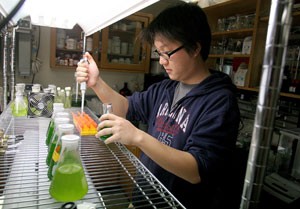With the growing demand for fuel and the concern of global warming, scientists are looking into producing ethanol or biodiesel from plants.
Joel Cuello, associate professor of agriculture and biosystems engineering, is using different species of algae to produce biodiesel and jet fuel. He is also using algae to create hydrogen gas.
“”There is a global race to be able to produce biodiesel fuel using algae,”” Cuello said. “”We have already produced the oil. The main challenge is to produce a scalable photobioreactor.””
The photobioreactor is used for large scale production of algae. It will also channel carbon dioxide emissions for biofuel production.
The photobioreactors do not require fertilizers or pesticides and will not damage the soil.
With the help of two other professors and a few students, Joel Cuello will mass produce algae and turn it into biofuel.
Michael Cusanovich, a regents professor emeritus of biochemistry and molecular biophysics, genetically engineers select species of algae in his lab. “”A time has come when algae is a viable alternative energy source. I have no doubt that this will be successful,”” Cusanovich said.
He also works with Kevin Fitzsimmons, a professor and research assistant of soil, water and environmental sciences, who grows algae for both biofuel and fish culture.
Takanori Hoshino, a doctoral student in philosophy and agriculture and biosystems engineering, assists Cuello in trying to produce hydrogen from algae.
“”I have been working on this project as a Ph.D. student for three years,”” Hoshino said.
One may wonder why the professors have chosen algae.
According to Cuello it is because “”algae are a renewable energy producing system using sunlight as an energy source via photosynthesis.””
He also said, “”Their energy productivity is two to five fold higher than traditional agricultural crops such as corn and soybeans.””
The demand for alternative fuels is growing because of the climate change. Biofuels can contribute to a reduction of carbon dioxide emissions.
Cuello said algae can be grown from using waste water and will not take away from the food animals eat, since algae is not traditionally used as food.
“”Algae are arguably the most sustainable biofuel feedstock for biofuels,”” Cuello said.
Cuello’s project also recently received a subcontract research grant from the Defense Advanced Research Projects Agency (DARPA) to design and evaluate an algae photobioreactor.









